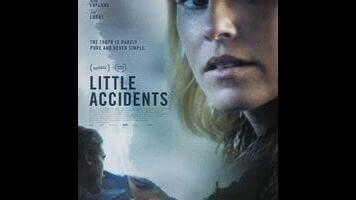An industrial accident is the catalyst for much mopey soul-searching in Sara Colangelo’s tedious feature debut. The setting is an economically depressed West Virginia town where the residents are still reeling from a coal mine collapse that killed 10 men. One miner was spared: Amos Jenkins (Boyd Holbrook), now crippled in body and spirit and facing a hellish dilemma. Should he testify truthfully to the corporate negligence that led to the collapse, which would put the mine out of business? Or should he feign ignorance in the interest of protecting his livelihood and maintaining his blue-collar colleagues’ short-term comfort?
That’s not the only town crisis: Lonely high-schooler Owen (Jacob Lofland) gets in a bind after causing the accidental death of bullying classmate JT (Travis Tope), hiding the body instead of reporting the incident to the authorities. JT just happens to be the son of one of the white-collar bigwigs, Bill Doyle (Josh Lucas), who may have had an inadvertent hand in the mine collapse. And Bill’s wife, Diane (Elizabeth Banks), distraught over the disappearance of her child and the pressures Bill is under at work, takes sexual solace with Amos after she meets him at a Bible study gathering.
All of these characters are in pain, and Colangelo never lets the audience forget it, since she’s directed everyone to wear similar brooding expressions and walk around as if this screwed-up world and its many adversities are a constant weight. Barely a smile is cracked, and any joy is fleeting. There’s just too much angst that is going unaddressed—a collective malaise that needs to be purged. The look of the film complements the pervasive dourness; cinematographer Rachel Morrison captures this purgatorial locale with the same kind of gray-green quotidian palette favored by Tim Orr in his collaborations with David Gordon Green. Would that it ever seemed like more than a half-hearted impersonation.
There’s nothing here that Green or his own cinematic forebear, Terrence Malick, haven’t done better elsewhere. When Bill and Diane trek morosely through a field of reeds in search of their missing son, it feels like a borrowed reference rather than a natural outgrowth—all indie-flick house style atop the shakiest of foundations. That’s not to say the performers don’t try and ground Colangelo’s story in some real, potent emotions. Lofland and Banks fare best in this regard, the former drawing on a sort of amateur genuineness (he seems, as he did in Jeff Nichols’ Mud, to be a young man very much of this specific time and place), the latter revealing the tortured essence of a cloistered rich housewife. But their efforts are undone by the flimsiness of the narrative, which hinges solely on two secrets left untold, generating the most monotonous sense of suspense. The confessions are the whole point, but when they finally come, they have all the power of a belch.

